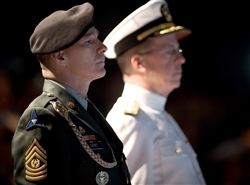|
A Soldier's Soldier Retires
"In the last two months, the Gaineys have been through a lot, and we realized something: Time is very short. And what we have decided today is to give your time back to you. So thank you very much." With that, the first Senior Enlisted Advisor to the Chairman of the Joint Chiefs of Staff hung up his Stetson and spurs and retired after a 33-year career. Gainey has advised Navy Adm. Mike Mullen and retired Marine Gen. Peter Pace on matters of concern to enlisted personnel since becoming the first to take over the newly-created position Oct. 1, 2005. Mullen, who hosted the ceremony at Fort Myer, Virginia, said everyone in the Defense Department will miss Gainey and his style of leadership. The soldiers, sailors, airmen, Marines and Coast Guardsmen are the sergeant major's total concern. "They are part of his family, and he cares for every single one," Mullen said. And the sergeant major has championed their concerns. "Neither arrogance nor laziness ever drove Sergeant Major Gainey into a corner to sit and growl," the chairman said. "No, to his very last day, Joe Gainey has barked -- sometimes loudly and always effectively. For 33 years now, he's led the pack." The Chairman said the Sergeant Major can be proud of his service, but that pride in the military is only part of his motivation; his real motivator is truth, the Chairman said. "It's what defines him, and as an institution, all of the services are better for it," Mullen said. "He's been vocal about policies that needed changing, and there have been changes, like the recently adopted longevity pay. "He's been vocal about the quality of our training, and we've made improvements, like soldiers using real weapons in basic training and our enlisted troops participating in joint professional military education." Gainey also has been vocal about teamwork. The Sergeant Major believes that personnel will always be soldiers, sailors, airmen, Marines or Coast Guardsmen first, but always must think about jointness. "We're that much tighter and together as a team because of it," the Chairman said. All his career, Gainey has "thrust himself -- body, heart and soul -- into being a soldier, a professional, a leader, an honest broker and teller of the truth," Mullen said. "Our servicemen and women have all been well served, as have our NATO partners, with whom he's engaged and helped strengthen their own NCO corps." Gainey has built relationships and has brought leaders together as a team to enhance U.S. joint and combined fighting capabilities in a time of war. "And he always stood up for his troops," the Chairman said. "That's why they trust him; that's why I trust him, and that's why we'll miss him." Gainey has worked tirelessly to make things better for the troops -- the men and women who are doing the fighting and sometimes dying for the United States. "The truth is that we give a lot of credit to the surge for our successes in Iraq," Mullen said. Army Generals David H. Petraeus and Raymond T. Odierno and other leaders get credit for the drops in violence there, the Chairman said, along with Shiite cleric Muqtada al-Sadr for holding his militia to a cease-fire. "But make no mistake, the real credit goes to the men and women of the armed forces and the families that support them," Mullen said. "We don't give enough credit for the successes in Iraq to the troops. And that's something Sergeant Major Gainey has made sure we all know, and we all understand." The Chairman noted that Gainey's efforts have helped make the military better. "He has ensured our enlisted force is better poised to fight and win in Iraq or anywhere else they are needed," he said. "Thank you, Sergeant Major, for a job well done." Mullen presented Gainey with the Distinguished Service Medal and Cindy Gainey, the Sergeant Major's wife, with the Outstanding Public Service Award. Gainey was being treated at Walter Reed Army Hospital earlier this year, after undergoing surgery to correct an old neck injury, when he suffered a stroke. Doctors placed him in a medically-induced coma for a week to allow his body the opportunity to recover. In his time as Senior Enlisted Advisor, Gainey has been a tireless advocate of the Armed Forces Retirement Home for retired enlisted servicemembers. He and his staff routinely visited residents there, completing projects and sometimes just visiting at bedsides. He and his wife, Cindy, visited just last week. Enlisted members of the Joint Staff told Gainey last week they had dedicated a bench in his name at the Armed Forces Retirement Home. The home is funded partially through $.50 monthly deductions from enlisted service members' and warrant officers' paychecks, and Gainey has urged the troops to lobby their service leaders to approve an increase of that deduction to $1 per month, which would result in $7 million in additional funding per year for the home. "I’ve talked to, I think, well over 5,000 troops and asked them, 'Would a dollar a month break your bank?' No one has said 'yes' yet," he said. "I’m a believer that, if we cannot take care of the past, how do we take care of the future?" Gainey said. "If we can’t take care of our past, how in the heck are we going to be able to take care of our wounded warriors in the future? "If you’ve never been out there, you have to make time," he said. "They are our past warriors. "Their eyes just light up," he said about elderly retired service members he’s visited at the home. "If they want to tell you war stories, listen to them, because that’s the life they lived." No decision has been made yet on the Sergeant Major's replacement. Our thanks to Jim Garamone and Kathleen T. Rhem of American Forces Press Service.  |





New! Comments
Join our conversation! Leave me a comment about this page in the box below. If your comment is about another page on this site, please leave your comment on that page, because I have no ability to move it to the correct page. Thanks!